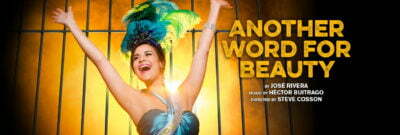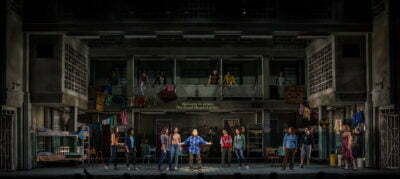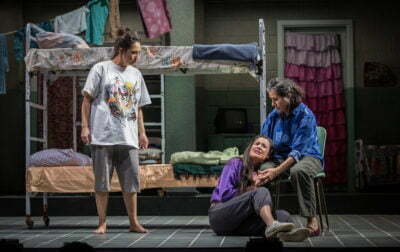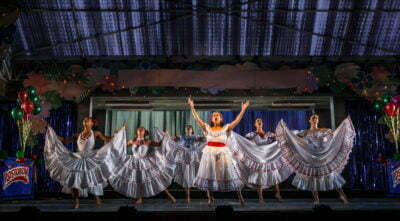Another Word for Beauty
 By José Rivera
By José Rivera
Directed by Steve Cosson
Music by Héctor Buitrago
Produced by Goodman Theatre, Chicago
Co-Commissioned by The Civilians
There’s Nothing that Can Kill a Show Like Too Much Exposition
Another Word for Beauty, the play now premiering at the Goodman, is a dramatic adaptation for the stage by José Rivera of a documentary called La Corona, about beauty pageants in a Colombian prison. That sentence contains everything that works, and everything wrong with this play. That the Colombian women’s prison Buen Pastor holds an annual beauty pageant is certainly an interesting premise, and in a documentary, we could hear the stories of real people as told by themselves. But in the form of a drama, what we get are endless monologues and flash-backs from characters we aren’t able to focus on, prior to a contest that doesn’t even occur until Act II of a play that is nearly three hours long. The text itself is often heavy-handedly didactic, and while we get a superficial treatment of a host of issues, I wished they had been treated with a lot more depth.

The narrator, Ciliana “The Mermaid” (Socorro Santiago), introduces us to the maximum-security prison, which used to be a nunnery. If Andrew Boyce and Emily Rebholz’s set and costume designs are accurate, then “maximum-security” means something very different in Colombia, but the design is not meant to be completely literal, since we are told the prison is divided into multiple cellblocks. Each cellblock votes to select one of its members as a contestant, and works to provide her with props and costumes. In each cellblock, Ciliana introduces us to the nominee, as well as another prisoner, who appears only for this scene, and closes it with a monologue about their own life. The segments each begin with a supertitle, one of which acknowledges the clichéd nature of the subsequent monologue, but we get ten permutations of the fallen woman story anyway.

The cellblocks have their own subcultures, based on the kind of prisoner within. The one for rich people has relatively cushy accommodations, meaning it complies with international standards. One cellblock is for what Ciliana describes as low-level offenders, although we later find out that its contestant, Yolanda (Stephanie Andrea Barron), did something quite violent. She is being separated from her son today because it is his third birthday, and children cannot remain in prison with their mothers past that. This shakes her confidence prior to the pageant. Another cellblock holds leftist political prisoners and members of the communist rebel groups. Its contestant, Nora (Zoë Sophia Garcia), condescendingly tells us that we had no idea Colombia has been in a civil war for fifty years, and that the country’s rebels and anti-communist militias export cocaine to the United States. The favorite to win the pageant is Isabelle (Carmen Zilles), a mass murderer in the cellblock for members of right-wing paramilitaries. Most of the other characters dislike her, but she’s formed an unlikely friendship with Nora, which could have been a whole play in itself.

Another Word for Beauty significantly improves in its second act, which depicts the beauty pageant. Rivera depicts it as being televised live, which is an idea that requires additional exploration (what would be the government’s purpose in doing that?), but adds a bit of dramatic impetus. The contest’s tone veers wildly between empowering and degrading for all involved, and awkward bewilderment abounds. Yolanda’s grief over her separation from her son is played for laughs, which is strange since it seemed to be portrayed seriously in Act I (other than that he was played by an adult), but the flashbacks we get in this part of the play are generally more successful in portraying character and societal background. I attribute that to them being acted out, instead of recited under a spotlight. The designers and the small band playing Héctor Buitrago’s music also have a chance to be a lot flashier and more theatrical, since the beauty pageant actually does look impressive. The large cast of actors, too, are given a lot more to do, although the characters still don’t interact with each other enough for us to really get invested in them.

Some people have suggested Another Word for Beauty would do better if it shaved 15-30 minutes, but I think it could stand to lose most of Act I. It is possible for a two and a half hour long play to provide a very clear portrait of a large cast of characters and their position in a foreign society while hardly supplying any information about their background. But that requires them to talk to each other, and for a playwright to allow an audience to fill in some things for themselves. Alternatively, the playwright could concentrate on a single relationship, and weave a large amount of background and glimpses at other characters into it. Rivera wanted to tell the stories of these women’s lives, and presumed his audience had little prior knowledge of Colombia. But Act II not only contains most of the crucial information, it also expresses refreshing ambivalence on the part of the playwright about the value of the pageant. While much of the dialogue in Act I is propagandistic, in Act II, the prisoners use their public platform to express remorse, while questioning what is to become of them, and the country generally. The atrocities of the civil war and drug-trade are hard to forgive, yet guilt is so pervasive, retribution would destroy society completely. It’s a complex and excruciating question that needs more focus.
Somewhat Recommended
Jacob Davis
[email protected]
Reviewed January 25, 2016
For more information, see Another Word for Beauty’s page on Theatre in Chicago.
Playing in the Albert Theatre at the Goodman, 170 N Dearborn, Chicago. Tickets are $25-75 with discounts for groups; to order, call 312-443-3800 or visit GoodmanTheatre.org. Performances are Wednesdays at 7:30 pm, Thursdays at 2:00 pm (except February 4) and 7:30 pm, Fridays at 8:00 pm, Saturdays at 2:00 pm (except in January) and 8:00 pm, and Sundays at 2:00 pm and 7:30 pm (except February 7 and 21), with an additional performance on February 16 at 7:30 pm. Running time is two and a half hours with one intermission. Recommended for audiences 14 and over.
